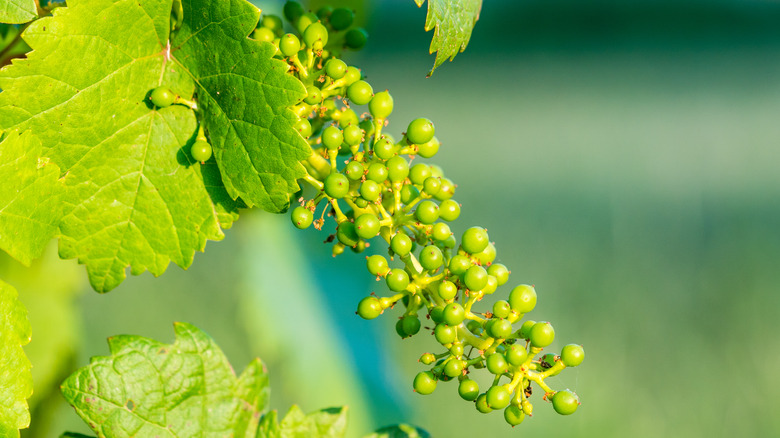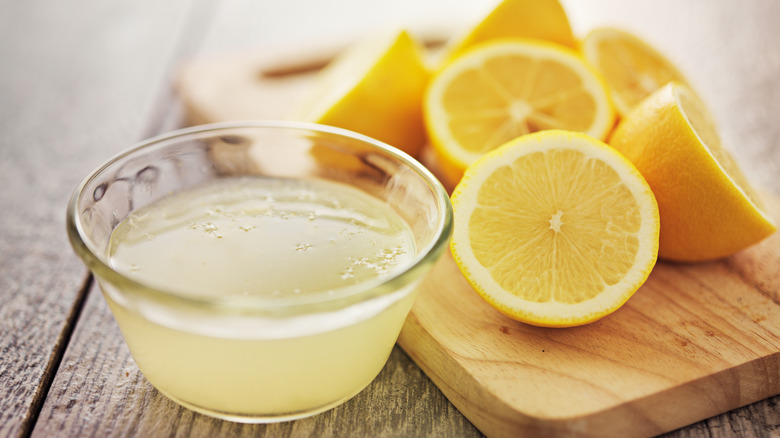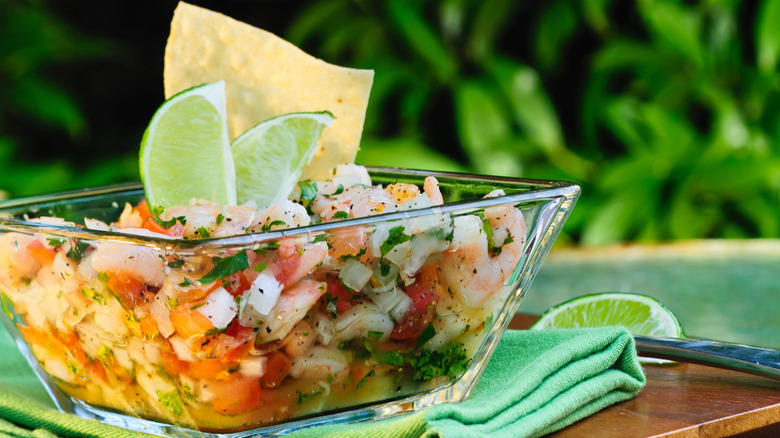What's The Best Way To Cook With The Tangy Ingredient Verjuice
First things first, what is verjuice? Verjuice, also spelled verjus or vert jus (which translates to green juice in French), is exactly that — a sour juice made from pressing green (meaning immature) fruits. It's most commonly pressed from unripened green grapes, though is sometimes made from crab apples, or other acidic immature fruits such as plums. It's typically a bright, luscious, almost neon green or yellow in color, but can also be shades of red depending upon which fruit is used.
While this may very likely be your first time hearing about verjuice, it's been documented since A.D. 71 in ancient Rome. It is now seeing a resurgence with the rise of mocktails and non-alcoholic beverages.
The best way to cook with the tangy juice is to use it just as you would any acid in a recipe — to brighten the dish and round out the flavors on the palate. The beauty of verjuice is that it's not as harsh as your typical acid, so a splash of verjuice will serve similarly as a squeeze of lemon in a dish. The role of an acid in cooking is to add balance and heighten the flavors of the end result — think of a squeeze of lime in a bowl of chili, or a splash of lemon juice over roasted asparagus. The acidulant rounds out the dish and adds a nice zing.
What does verjuice taste like?
Given it's made from sour-tasting, unripened fruit, verjuice is tart and sour. However, it's on the milder side and less astringent than a lemon. It's softer and sweeter than citrus juice or vinegars, and adds a subtle tartness to any dish you add it to. Unlike vinegar or wine, it is not fermented, nor does it contain any yeasts or alcohol.
While sweeter than lemon juice, it is still far more acidic than just citrus juice, and not something you want to sip on its own: It is not a replacement for a glass of grape juice unless you enjoy a good pucker.
It's a simple process to make your own verjuice — mashing unripened grapes and bottling the juice is about all it takes. Or, just run the fruit through a juice, but keep in mind you may want to strain out the seeds, or your juice will take on an added bitter component. You can also purchase a bottle at a heftier price tag, as its popularity grows and it becomes easier to be found on shelves. Verjuice will also keep in the fridge for a few months, but odds are you will use it up before then.
The history of verjuice
Historically, verjuice was a by-product of winemaking. It was pressed from the unripened grapes in vineyards that were picked to clear space and ensure quality control of the grapes used for wine.
Agresto, the Italian word for verjuice, was so commonplace it had a double-meaning outside of the kitchen, to insinuate someone was a sourpuss. While its origins are recorded in ancient Rome, it was especially popular in medieval Europe on monasteries, due to the surrounding vineyards: This is where it became an ingredient in the original Dijon mustard in France. Verjuice was also thought to have medicinal properties, and was often used to treat colds in horses by mixing it with olive oil and applying it up their nostrils. It was also believed to serve as a tonic and help soothe the stomachs of humans.
Verjuice fell out of favor in the 1800s, as lemons grew in popularity and were more widely available.
How to cook with verjuice
You can sub verjuice in anywhere you'd use vinegar, lemon, or lime juice. It is a milder addition to a homemade vinaigrette for those sensitive to the bite of vinegar. It also serves as a marinade for poultry and meats, and is the perfect accompaniment to a Dijon bath. It's perfect for deglazing and loosening the flavorful food stuck to the bottom of a pan, and ensuring it gets incorporated into your sauce.
Cocktails and mocktails are leveled up with the addition of verjuice. Add a splash to a vodka or tequila soda for a citrusy-sweet tone, or make a refreshing non-alcoholic spritzer. A dollop in a cup of tea is a gentler option over a squeeze of fresh lemon.
Fish and seafood benefit from the milder citrus and it's a perfect component to a summer ceviche as well as a salsa condiment. Verjuice pairs well in meals with wine and will complement, rather than interfere with, the tasting notes of the pour. Its inherent sweetness makes it a perfect addition to desserts as well, such as poaching pears with some added cinnamon or cardamom.



